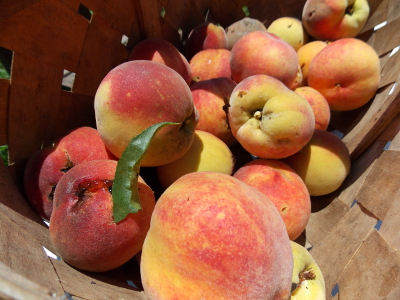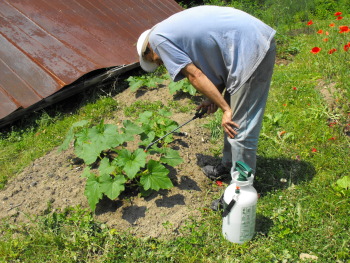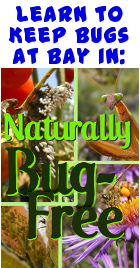
"Why don't you just use a fungicide/insecticide?"
 "Why not just give in and
spray high risk crops with Neem Oil (or whatever fungicide you are
comfortable with)?" --- Robert
"Why not just give in and
spray high risk crops with Neem Oil (or whatever fungicide you are
comfortable with)?" --- Robert
I get this question a
lot, or the related "Why don't you just spray an
insecticide?" Folks familiar with organic gardening are used
to "safe" sprays like neem oil that do many of the same jobs as
non-organic pesticides or fungicides. But my philosophy is a
little different.
No matter how
specific you think your organic spray is, it's going to do damage
to beneficials in the same category as the problem species you're
trying to combat. The question is, are you willing to harm
the fungi in the soil that help your trees suck up micronutrients,
resulting in a tree that's going to need more help every
year? How about if that also means the food from the tree is
going to be less nutrient dense? Basically, by spraying
organic killers of any kind, I'd be going back to
storebought-produce quality, and the goal of growing our own is to
feed ourselves tastier and more nutritious food than we could buy
in any store.
 Without chemicals, you have to be a bit
smarter, willing to experiment, and able to handle failures.
In some cases, we've come up with systems that work perfectly for
our climate. For example, instead of spraying Bt
to prevent the dastardly vine
borers that pretty much kill all squash in our region, I now
take a multi-prong (but chemical-free) approach. First, I
chose varieties that are less tasty to vine-borers (butternut
squash and yellow crookneck squash), which solves the problem for
the winter squash entirely. With summer squash, even the
crooknecks succumb to the vine borers eventually, but as long as I
plant a new bed of squash every two weeks in the summer, we
still end up giving bagsful away.
Without chemicals, you have to be a bit
smarter, willing to experiment, and able to handle failures.
In some cases, we've come up with systems that work perfectly for
our climate. For example, instead of spraying Bt
to prevent the dastardly vine
borers that pretty much kill all squash in our region, I now
take a multi-prong (but chemical-free) approach. First, I
chose varieties that are less tasty to vine-borers (butternut
squash and yellow crookneck squash), which solves the problem for
the winter squash entirely. With summer squash, even the
crooknecks succumb to the vine borers eventually, but as long as I
plant a new bed of squash every two weeks in the summer, we
still end up giving bagsful away.
In other cases, I
hand pick and (impatiently) wait for the natural predators of pest
insects to show up. For example, we used to be overrun with
asparagus
beetles, but I nearly wiped out their population by
thrice-weekly squashing sessions. This year, I saw some show
up  again for the first time in years, but
after a round of squashing, I started noticing more wheel bugs and
ladybug larvae on the asparagus and no more asparagus beetles.
again for the first time in years, but
after a round of squashing, I started noticing more wheel bugs and
ladybug larvae on the asparagus and no more asparagus beetles.
Fungi don't seem to
have natural enemies (or at least I can't see them with my naked
eye. Some sources suggest that good fungi build up on plant
surfaces and battle the bad fungi for space.) So I plant
blight-resistant varieties, site fungal-prone plants in the
sunniest part of our garden, pluck off fungal damage as soon as I
see it, and trellis plants like cucumbers so they stay away from
the damp ground. And, if worst comes to worst, I rip out
varieties (and sometimes whole species) that can't handle our
damp.
Which is all a long
way of explaining that our peaches are still on probation, and if
I can't find a cultural control for brown rot, I'm willing to let
them go. Sure, they're one of my favorite fruits, but I
could put the same space and energy into more dependable June
apples, blueberries, blackberries, and late raspberries if I have
to. (Hear that peach trees --- either shape up or ship
out!) I'd rather eat healthier, tastier food of a
second-favorite variety than throw chemicals into the ecosystem I
live in and eat out of.
Want more in-depth information? Browse through our books.
Or explore more posts by date or by subject.
About us: Anna Hess and Mark Hamilton spent over a decade living self-sufficiently in the mountains of Virginia before moving north to start over from scratch in the foothills of Ohio. They've experimented with permaculture, no-till gardening, trailersteading, home-based microbusinesses and much more, writing about their adventures in both blogs and books.
Want to be notified when new comments are posted on this page? Click on the RSS button after you add a comment to subscribe to the comment feed, or simply check the box beside "email replies to me" while writing your comment.


Well said. As a home-owner interested in providing for my own, we use no sprays either. We also live in a climate very near yours, up further north in Virginia. I also have three peach trees.
Here's my point: Yes we have struggled (and still do) from brown rot. However, it hasn't destroyed the entire crop ever. Simple controls such as thinning out the peaches so they do not touch, or removing the partially rotten peaches and mummies have been all we've done. Our biggest problem, so far, has not been the brown rot but the worms. (It may have also been squirrels last year ...) Now ... if I could just get the law to allow chickens close to the edge of the property where I planted the peach trees, I might be able to deal with the worms problem ...
Dan
Hi Anna and Mark,
Sounds like Maynard Murray's "Sea Energy Agriculture" should be on your reading list.
One of his experiments involved 4 peach trees.
He treated two with dried sea salt at 1000#/acre. Two he left untreated.
The treated ones had perfect fruit.
Somehow everyone focuses on killing bugs rather than helping the tree resist the bugs.
He has another story about his experience with chickens. I won't attempt to repeat his experiment from memory, but it is WELL worth your attention.
IMHO :).
warm regards to you both, John
For fungal management, I try to plant things that will be vulnerable to fungal diseases in areas where they get early morning sun and dry out quickly by mid-morning. I didn't know about this technique when I first started planting five years ago, so unfortunately my figs are in a spot where they don't get morning light until around 9:30am and don't fully dry until 11am or so. For the past 3 summers I've been dealing with fig tree rust on these two trees. It's not so bad that it severely affects the crop, so I just try to manage it as I can.
I have some younger trees coming up in different areas of the property so I'm going to compare their placement with incidence of disease. Of course, there are other microclimate factors that make direct comparisons tough, but eventually I'm hoping I'll find a way to keep my figs from defoliating completely by September.
I don't even bother with peaches or plums because I've been told that our humidity makes spraying every few weeks a necessity for those who want good crops.
On the other hand, rose gardeners along the Gulf have adopted the attitude that mild/moderate fungal disease is just part of the life cycle of some plants growing in the humid south. I might have to adopt that attitude about my figs.
Having a bit of a challenge posting a comment, probably a problem at my end!
Have you considered spraying the peaches and affected area with aqueous oxygen? Just a thought, I rid a basement of mould and mildew odour and spores by spraying with aqueous oxygen.
It reverts back to plain water in 15 minutes, so no residual effects. Great for septics and grey water ponds too, no lasting effect on bacteria.
Anna,
I completely understand your objection to chemical applications to your crops, after all, I am an organic farmer. However, I must ask: Is neem oil as toxic as it sounds it sounds in your post?
For thousands of years, the various parts of the neem tree has been used not as an insecticide or fungicide, but rather a health supplement. It's efficacy is well known to alternative medicine practitioners, and it can be easily obtained from health food stores or the internet. Neem oil is the primary ingredient in most of the organic herbal toothpastes, and Indians (note: not Native Americans)have been chewing on the sticks for centuries as a sort of primitive toothbrush. Neem oil consumption is regarded as SAFE to mammals, as evidenced by it's use in not only toothpaste, but cosmetics, soaps, and topical applications.
Now, environmental effects...
Neem oils active chemicals (a combination of nearly 20 similar compounds), are easily broken down by UV rays from the sun. The half life in soil averages 3 days, and in water about 1 hour. On plant surfaces it is broken down in 2-4 days. The remaining compounds are further broken down by soil microbes.
Neem oil only works upon consumption. So an insect must chew on the leaves of which have been sprayed in order to have an impact. Spraying a low dosage (without soap), will not harm insects, but still control fungi. Since beneficial insects do not consume plant material, only other insects, it is completely safe for them. It is registered as non toxic to bees, spiders, mammals, and birds.
So, the point I have been attempting to make is that neem oil itself does not kill insects or fungi at all. It rather works by long term control, by disrupting the hormone production and sequence of insects that consume the neem. It basically breaks the life cycle much in the same way squashing adults and eggs works. Adults will lay sterile or birth defect laden eggs. Juvenile insects will never develop into adults, because the hormone that triggers molting can not be produced. So, at the end of their juvenile stage, they simply die.
Neem oil also has very limited effects on soil fungi unless applied as a 'root zone drench' for the control of fungus gnats. Being hydrophobic it resists integration into the soil (as most oils do) and instead simply sits on the surface, where it is rapidly broken down by sunlight. So, as long as you have a thick layer of mulch around your trees (preferably hardwood), it shouldn't have a noticeable effect on mychorrhiza. Also, it isn't very effective on active fungi, instead working by spore prevention.
I'm sure you already know, but for others that are reading, underground fungi are only reproducing and releasing spores when you see a mushroom. As long as you aren't spraying when you have mushrooms present, your soil fungi should be perfectly safe. No one truly knows how neem oil works on fungi and viruses, but it is widely believed to be the naturally occurring copper in the oil.
Alas, I am not fortunate enough to just pick through the crop remains after mother nature has had her share. Living in the bustling and busy horse capitol of the world, Lexington, KY, our living expenses are very high ($75 for internet each month alone)! I make all of my income from our CSA program and sales to fine dining restaurants. While I have convinced my CSA members that the holes in their collards, kale, and arugula are perfectly fine with my frequent "If a bug wouldn't eat it, why would you?", chefs are a different story. They will only accept the finest produce, and for that they will pay top dollar. This allows me to live quite well, and also work entirely from home. I'm really just glad that we can make do with something as simple as neem oil when all of the farms around us are spraying God only knows what.
However, I understand your deep seated commitment to your life style. As it is what you have chosen to do in life, and I am certain you have strong convictions about such things. I thank you for taking the time to explain your rational and I also respect your decision for what you are doing...after all, I read nearly daily! I really wish you the best with your peaches, as there is nothing like the juice of a freshly picked peach running down your arm and dripping off your elbow in the sticky heat of summer!
Robert